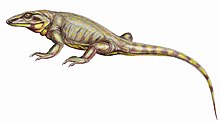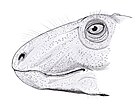Varanodon
| Varanodon Temporal range: | |
|---|---|

| |
| Life restoration of Varanodon agilis | |
| Scientific classification | |
| Domain: | Eukaryota |
| Kingdom: | Animalia |
| Phylum: | Chordata |
| Clade: | Synapsida |
| Family: | †Varanopidae |
| Subfamily: | †Varanopinae |
| Genus: | †Varanodon Olson, 1965 |
| Type species | |
| †Varanodon agilis Olson, 1965 | |
Varanodon is an extinct genus of amniotes from the family Varanopidae. It has been found in the Chickasha Formation of Oklahoma, which dates to the Roadian stage of the Middle Permian.[1] The largest varanopid known at the time of its description, with a skull length of 17.5 centimetres (6.9 in),[2] it was closely related to and lived alongside its much larger relative Watongia.[3] The two may represent growth stages of a single animal.[4]
See also
References
- ^ Laurin, Michel; Hook, Robert W. (2022). "The age of North America's youngest Paleozoic continental vertebrates: a review of data from the Middle Permian Pease River (Texas) and El Reno (Oklahoma) Groups". BSGF - Earth Sciences Bulletin. 193: 10. doi:10.1051/bsgf/2022007. ISSN 1777-5817.
- ^ Olson, E.C. (1965). "New Permian vertebrates from the Chickasha Formation in Oklahoma" (PDF). Circular Oklahoma Geological Survey. 70: 1–70.
- ^ Reisz, R.R.; Laurin, M. (2004). "A reevaluation of the enigmatic Permian synapsid Watongia and of its stratigraphic significance". Canadian Journal of Earth Sciences. 41 (4): 377–386. doi:10.1139/e04-016.
- ^ Maddin, H.C.; Evans, D.C.; Reisz, R.R. (2006). "An Early Permian varanodontine varanopid (Synapsida: Eupelycosauria) from the Richards Spur locality, Oklahoma". Journal of Vertebrate Paleontology. 26 (4): 957–966. JSTOR 4524646.






